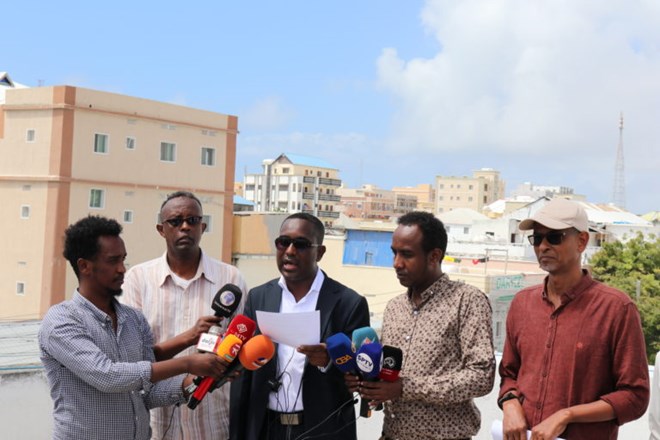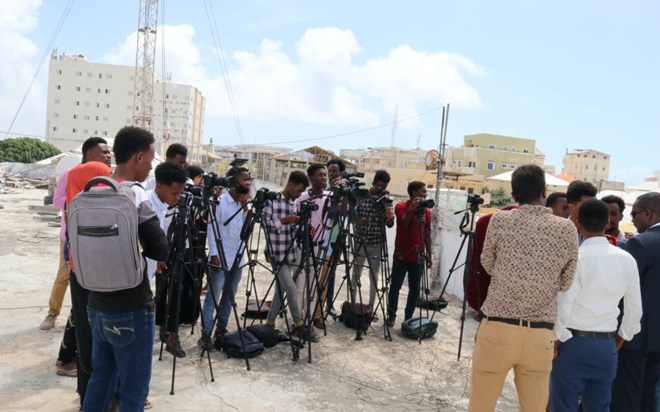
Hassan Istiila
Monday October 10, 2022

SJS Secretary-General, Abdalle Mumin (centre) speaks during a press conference in Mogadishu alongside FESOJ Secretary-General, Farah Omar on Monday 10 October 2022. | PHOTO/SJS.
Mogadishu (HOL) - Somalia's media rights groups have expressed concern about the new directive issued by Somalia's federal government containing a blanket crackdown on media outlets that published what it deems propaganda for the militant group al Shabab.
On Saturday, the federal government announced a crackdown on media outlets that publish what it deems propaganda for al-Shabaab.
Deputy Minister for Information, Culture and Tourism, Abdirahman Yusuf, warned that offenders who violate the order would be punished.
The Federation of Somali Journalists (FESOJ), Somali Journalists Syndicate (SJS), Somali Media Association (SOMA) and Somali Independent Media Houses Association (SIMHA) said in a joint statement on Monday that they are concerned that the new measures within the government directive might restrict press freedom in the country.
"While we recognize that the ongoing fighting between the federal government forces and al-Shabaab may have triggered a persisting concern relating to the use of social media for propaganda purposes, we are concerned that the new measures within the government directive, which was not consulted with media stakeholders, might unduly restrict otherwise legitimate expression and press freedom in the country. "
The media organizations stated that the "vaguely-worded directive" might limit the ability of journalists to freely report the ongoing operations against the armed group.
"It might also restrict access to information relating to continuing security operations from the general public. For example, following Saturday's directive Shabelle Media was forced to remove al-Shabaab's reaction to the government directive from its social media. Several other journalists told us they could not share information out of fear of reprisal from the authorities."
"The blanket suspension and ban on both media outlets and social media platforms allegedly for spreading al-Shabaab-related information are worrying and restrictive. For instance, the government directive suspended Telegram, a cloud-based encrypted instant messaging platform many Somalis use for sharing information. The complete shutdown of Telegram in the country not only impacts many ordinary Somalis but also puts into question this restriction's purpose."
They are also concerned that government agencies might use the new directive to silence the legitimate critics of the government and its security forces, including journalists, human rights defenders, independent researchers, analysts and others.
"Lastly, we are extremely alarmed that the new directive has already brought security concerns for some local journalists and media houses following a counter-directive by al-Shabaab on Sunday, threatening journalists and other entities implementing the government directive," they said in the statement.
Minister Abdirahman Yusuf added that the government has also launched cyber operations against "terrorist accounts" on social media and has disabled over 40 accounts on platforms such as Facebook and Twitter in the past 48 hours.

Reporters cover a press conference by media leaders in Mogadishu on Monday October 10, 2022. | PHOTO/SJS.
However, Yusuf insisted that the measures would not affect journalists' regular news coverage of al-Shabab in Somalia and that it was not a question of clamping down on free speech.
The country's media rights organizations called for the Ministry of Information of the Federal Government to review its directive and ensure that the rights of journalists and media freedom are not unduly restricted.
"Article 18 of the Somali Federal Provisional Constitution guarantees the right to Freedom of Expression and Opinions, while Article 32 stipulates the right to access information. Meanwhile, Article 38 of the Constitution prohibits any rights limitations, including the right to freedom of expression, without demonstrably reasonable, lawful, justified and fair manner," they added.
They called for the government to ensure that freedom of expression, media freedom and the rights of journalists are respected, protected and promoted.
The move comes as Somalia's armed forces, backed by local militias and international allies, wage an aggressive counteroffensive against the al-Qaida affiliate.
Somali government forces, backed by the local pro-government militia groups, have intensified their offensive against al-Shabab in several parts of the country, killing hundreds of al-Shabab fighters in the latest operations.
State-owned-media reported on Monday that at least 200 members of the al-Qaeda-affiliated militant group al-Shabab were killed in a day-long battle in Jicibow village, approximately 25 km north of Buulaburte district in the Hiiraan region. The fight began early Sunday morning and ended late Sunday evening.
African Union forces drove the armed group out of Mogadishu in 2011. However, it still controls swaths of the countryside.